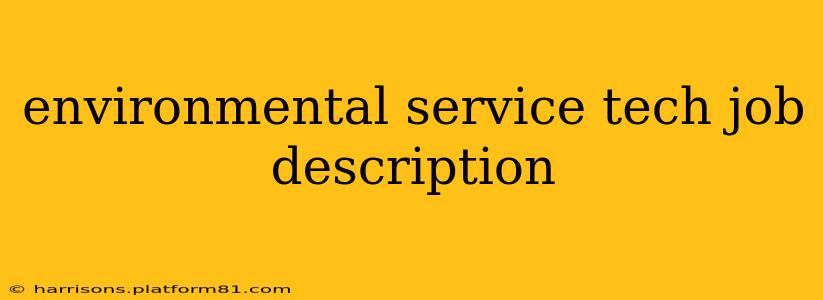Are you passionate about environmental sustainability and eager to contribute to a cleaner, healthier world? A career as an Environmental Service Technician (EST) might be the perfect fit. This job description outlines the key responsibilities, qualifications, and benefits associated with this vital role. ESTs play a crucial part in protecting our environment, and this description will highlight why this is a rewarding and impactful career choice.
What Does an Environmental Service Technician Do?
Environmental Service Technicians perform a wide range of tasks related to environmental protection and remediation. These tasks can vary significantly depending on the specific employer and industry, but generally involve:
- Waste Management: Handling, sorting, and disposing of hazardous and non-hazardous waste materials according to all relevant regulations. This often includes properly labeling containers, ensuring safe transportation, and maintaining detailed records.
- Pollution Control: Monitoring air and water quality, identifying sources of pollution, and implementing control measures to minimize environmental impact. This might include operating and maintaining pollution control equipment.
- Environmental Remediation: Participating in cleanup efforts for contaminated sites, following established protocols to ensure safety and effectiveness.
- Sampling and Analysis: Collecting environmental samples (water, soil, air) and conducting basic laboratory analyses to assess pollution levels and identify contaminants.
- Data Collection and Reporting: Maintaining accurate records of all activities, including sampling data, remediation progress, and waste disposal information. Preparing reports for regulatory agencies and clients.
- Compliance Monitoring: Ensuring that all operations comply with relevant environmental regulations, permits, and standards. This includes staying up-to-date on changing legislation.
- Equipment Maintenance: Maintaining and repairing environmental monitoring and remediation equipment, ensuring its proper functioning and safety.
- Safety Procedures: Adhering to strict safety protocols to minimize risks associated with handling hazardous materials and working in potentially hazardous environments.
What Skills and Qualifications Do You Need?
While specific requirements vary, most employers seek candidates with the following:
- High School Diploma or GED: A minimum education requirement, although some positions may prefer an associate's degree or vocational training in environmental science, environmental technology, or a related field.
- Experience: Prior experience in environmental work is beneficial, although entry-level positions are available for those with relevant training.
- Technical Skills: Proficiency in using environmental monitoring equipment, understanding laboratory procedures, and familiarity with relevant software.
- Communication Skills: The ability to communicate effectively with colleagues, clients, and regulatory agencies, both verbally and in writing.
- Problem-Solving Skills: The capacity to identify and solve problems related to environmental contamination and waste management.
- Physical Stamina: The job often involves physical labor, such as lifting, carrying, and working outdoors in various weather conditions.
- Attention to Detail: Accuracy and precision are essential in ensuring proper waste handling, sampling, and data recording.
- Strong Work Ethic: ESTs must be reliable, responsible, and committed to adhering to safety regulations and environmental best practices.
What are the career paths for an Environmental Service Technician?
Many environmental service technicians choose to specialize in specific areas over time. Some possibilities include:
- Hazardous Waste Management Specialist: Focusing on the safe handling and disposal of hazardous materials.
- Environmental Remediation Specialist: Concentrating on the cleanup of contaminated sites.
- Water Quality Analyst: Specializing in monitoring and managing water resources.
- Air Quality Analyst: Focusing on air pollution control and monitoring.
What are the common certifications for Environmental Service Technicians?
While not always mandatory, certifications can significantly enhance career prospects and demonstrate competence in specific areas. Examples include:
- Certified Hazardous Materials Manager (CHMM)
- Certified Environmental Auditor (CEA)
- Various certifications offered by specific organizations and agencies (check your local regulations).
What are the benefits of working as an Environmental Service Technician?
A career as an EST offers numerous benefits:
- Making a Difference: Contribute directly to environmental protection and sustainability.
- Job Security: Growing demand for environmental professionals ensures job security.
- Variety of Work: Tasks are diverse and challenging, preventing boredom.
- Opportunities for Advancement: Potential for career growth and specialization.
- Competitive Salaries: Salaries are generally competitive, reflecting the importance of the role.
This job description provides a comprehensive overview of the Environmental Service Technician role. If you're passionate about the environment and possess the necessary skills, this career path offers significant personal and professional rewards. Remember to research specific job postings for detailed requirements and qualifications.
